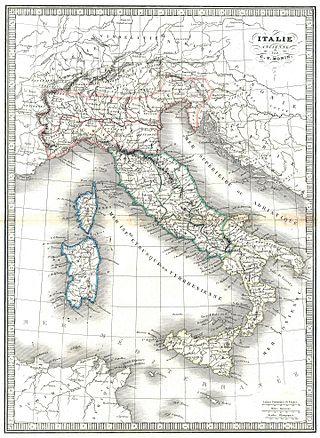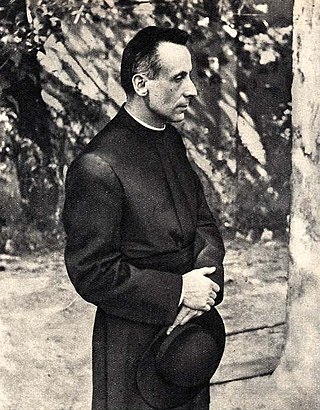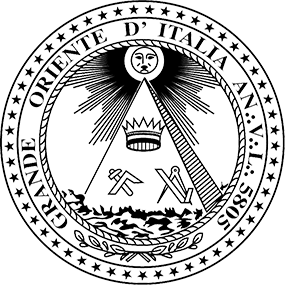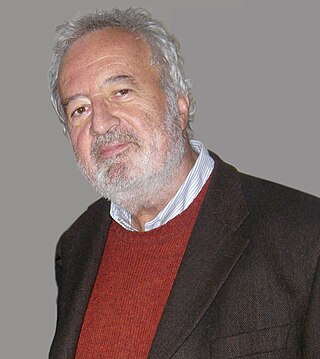
Propaganda Due was a Masonic lodge, founded in 1877, under the Grand Orient of Italy. Its Masonic charter was withdrawn in 1976, and it transformed into an illegal, clandestine, anti-communist, anti-Soviet, anti-leftist, pseudo-Masonic, and radical right criminal organization and secret society operating in contravention of Article 18 of the Constitution of Italy that banned secret associations. Licio Gelli continued to operate the unaffiliated lodge from 1976 to 1984. P2 was implicated in numerous Italian crimes and mysteries, including the collapse of the Holy See-affiliated Banco Ambrosiano, the murders of journalist Mino Pecorelli and banker Roberto Calvi, and corruption cases within the nationwide bribe scandal Tangentopoli. P2 came to light through the investigations into the collapse of Michele Sindona's financial empire.

Emilia-Romagna is one of the 20 administrative regions of Italy, situated in the north of the country, comprising the historical regions of Emilia and Romagna. Its capital is Bologna. It has an area of 22,446 km2 (8,666 sq mi), and about 4.4 million inhabitants.

Alceste De Ambris was an Italian syndicalist, the brother of fascist politician Amilcare De Ambris. He was a Freemason and had a major part to play in the agrarian strike actions of 1908 in Parma.

Gianni De Michelis was an Italian politician, prominent member of the Italian Socialist Party (PSI), who served as minister in many Italian governments in the 1980s and early 1990s.

Giuseppe Dossetti was an Italian jurist, a politician, and from 1958 onward, a Catholic priest.

The Grand Orient of Italy (GOI) is an Italian masonic grand lodge founded in 1805; the viceroy Eugene of Beauharnais was instrumental in its establishment. It was based at the Palazzo Giustiniani, Rome, Italy from 1901 until 1985 and is now located at the Villa del Vascello. Its current Grand Master is Italian journalist Stefano Bisi.
Arcangelo Ghisleri was an Italian geographer, writer, and Socialist politician.

The Flags of Napoleonic Italy were the green, white and red tricolour flags and banners in use in Italy during the Napoleonic era, which lasted from 1796 to 1814. During this period, on 7 January 1797, the green, white and red tricolour was officially adopted for the first time as a national flag by a sovereign Italian state, the Cispadane Republic. This event is commemorated by the Tricolour Day.

Tommaso Palamidessi was an Italian esotericist. Drawn to astrology, parapsychology, and yoga-tantric doctrines, he was active in the field of the occult and developed a form of Esoteric Christianity that he called Archeosophy. In 1968, he founded the Archeosophical Society in Rome, which is still active and has several thousand members in Italy and the rest of Europe.

Torino Porta Nuova railway station is the main railway station of Turin, northern Italy. It is the third busiest station in Italy for passenger flow after Rome Termini and Milan Central, with about 192,000 journeys per day and 70 million travellers a year and a total of about 350 trains per day. Porta Nuova is a terminal station, with trains arriving perpendicularly to the facade. The station is located in Corso Vittorio Emanuele II, right in front of Piazza Carlo Felice.

Fernando Vianello was an Italian economist and academic. Together with Michele Salvati, Sebastiano Brusco, Andrea Ginzburg and Salvatore Biasco, he founded the Faculty of Economics of the University of Modena and Reggio Emilia.

Enrico Bignami was an Italian merchant, and the editor of La Plebe, a socialist newspaper.

Frecciabianca is a high-speed train of the Italian national train operator, Trenitalia, and one of its Le Frecce brands. The name, which means "white arrow", was introduced in 2011; these services were previously known as Eurostar City Italia. Frecciabianca trains operate at speeds up to 200 km/h (124 mph).
Freemasonry in Italy dates to the first half of the eighteenth century. Its success largely depended on the lack of enthusiasm with which Papal bans on the order were enforced in the various states, but after the end of the Napoleonic regime, Freemasonry was suppressed in most of the peninsula. The start of the unification process in 1859 saw a revival in Freemasonry. Giuseppe Garibaldi, a leader of Italian unification, was an active mason and a keen supporter of the craft. In the 1920s Freemasonry was again suppressed under Fascism but revived again after the fall of Benito Mussolini. Today's Italy contains a wide variety of Masonic observances, regular, liberal, male, female and mixed.
This is a list of the major football derbies in Italy.
The Società anonima delle strade ferrate della Lombardia e dell'Italia Centrale was a joint-stock Anglo-French-Italian private company formed, following the partition of the territory, and the railways built in it, under construction or planned, resulting from the defeat of Austria in the Second Italian War of Independence, following the convention of 25 June 1860 among the Ministers of King Vittorio Emanuele II for Public Works and Finance and the previous Imperial-regia società privilegiata delle strade ferrate lombardo-venete e dell'Italia Centrale.
The Società Anonima per la Strada Ferrata dell'Italia Centrale was a railway company established in 1851 for the purpose of creating a railway link between Piacenza, Bologna and Tuscany. It later became part of the Milan - Bologna Railway.

Arturo Reghini was an Italian mathematician, philosopher and esotericist.

Carmen Moscariello is an Italian poet.
Carlo Francovich was an Italian politician, partisan and literary historian.














